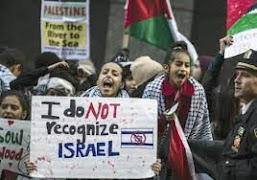I recently heard from a colleague serving a medium-sized
congregation on the West Coast that he is very afraid to talk about Israel from
the pulpit. He fears the reactions he might receive from his community. If he
is supportive of Israel’s war in Gaza, there are many who will condemn him for
supporting the “genocide” of the Palestinian people. On the other hand, if he is critical, there
are those who will accuse him of being a traitor and a supporter of Hamas.
Similarly, in a rabbinic Facebook group of which I am a part, a colleague shared an Email from a potential congregant that said something along the lines of:
Hi! I
am a deeply committed Jew and I am looking for a synagogue to call home. I also
believe that the State of Israel is guilty of racism, hatred, and violence
against a defenseless Palestinian population. After much thought and personal
prayer - and considering the injustice I see playing out in Gaza and the West Bank,
I have concluded that I cannot support Israel or Zionism. Given that I hold
these views, would I be welcome in your congregation? (Note: This is not the exact text - I am paraphrasing in order to respect confidentiality)
The responses from my colleagues were quite diverse. Some said
that they would never allow someone who held those beliefs to be a part of
their community. There is no room for an anti-Zionist within their
congregation. Others said that the email
was an opening for a conversation, and that once they met with the rabbi, they
would learn the errors of their ways and change their position. Others said that this letter was indicative of many conversations that they have had with college and High School students on a daily basis. Many said that we should not have litmus tests for membership. We don’t require congregants
to believe in God, keep a kosher home, marry only Jews, or attend services.
While they may disagree with this potential member, condemnation of Israel is
not – and never should be – a prerequisite for becoming part of a holy community.
After all, what if there are currently members of the community who share the
views of this potential new member? Should
they be expelled?
These two examples highlight the complexity and explosive nature of the current level of discourse the Jewish community is facing as we deal with the trauma of October 7th and its aftermath. The problem is amplified by the toxicity of anti-Israel protests that are taking place online, on college campuses, and in the streets and halls of government. Many of those who defend Israel are increasingly strident in their absolute rejection of any criticism.
Here in
Denver, we have witnessed the recent chaos that erupted in the City Council as
a resolution calling for a ceasefire in Gaza was hotly debated and ultimately
defeated. We also saw how the Colorado Speaker of the House succumbed to
pressure from extreme members of her caucus and disinvited family members of the
hostages in Gaza from entering the House Chambers- a position she later on
regretted and apologized for taking. These and similar scenes around the
country only serve to increase the polarization and disinformation that is
currently gaining traction.
While it is essential that the hostages in Gaza be released and that Hamas be defeated, there are legitimate questions that need to be asked regarding the way that this war is being waged.
- Is there a limit to the number of Palestinian casualties that the IDF can inflict before it is too much?
- Can we negotiate with a terrorist group (Hamas) whose stated goals are the destruction of the State of Israel and the Jewish people?
- What will happen once the war is over and the dust settles in Gaza? Who will rebuild it? Is there any path towards peace?
- Should the main focus of this military campaign be the release of the hostages or the destruction of Hamas?
- When will elections be held and, hopefully, a new government be put in place that does not contain extremists, racists and religious fanatics?
In the chaos of war, it is very difficult to focus on
anything other than the battles at hand, I pray that those who have the ability
and responsibility to affect change and make policy do not wait to address
these vitally important issues. If they do not, then the lives that have been
lost and the pain and suffering that has been inflicted on all sides will be in
vain. I also pray that we learn to engage in real conversations with those with
whom we disagree. Diatribes must be replaced by dialogue.


No comments:
Post a Comment